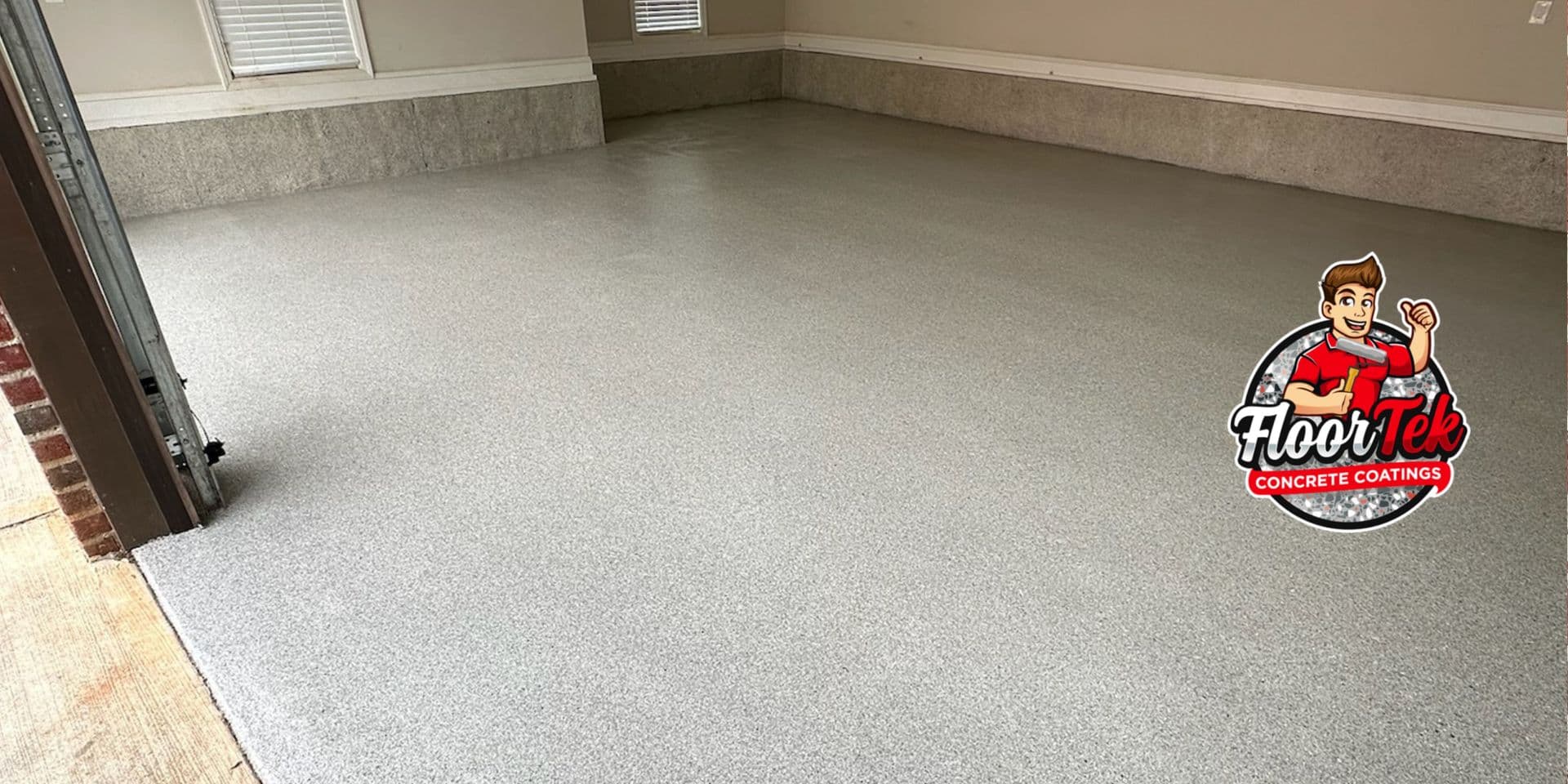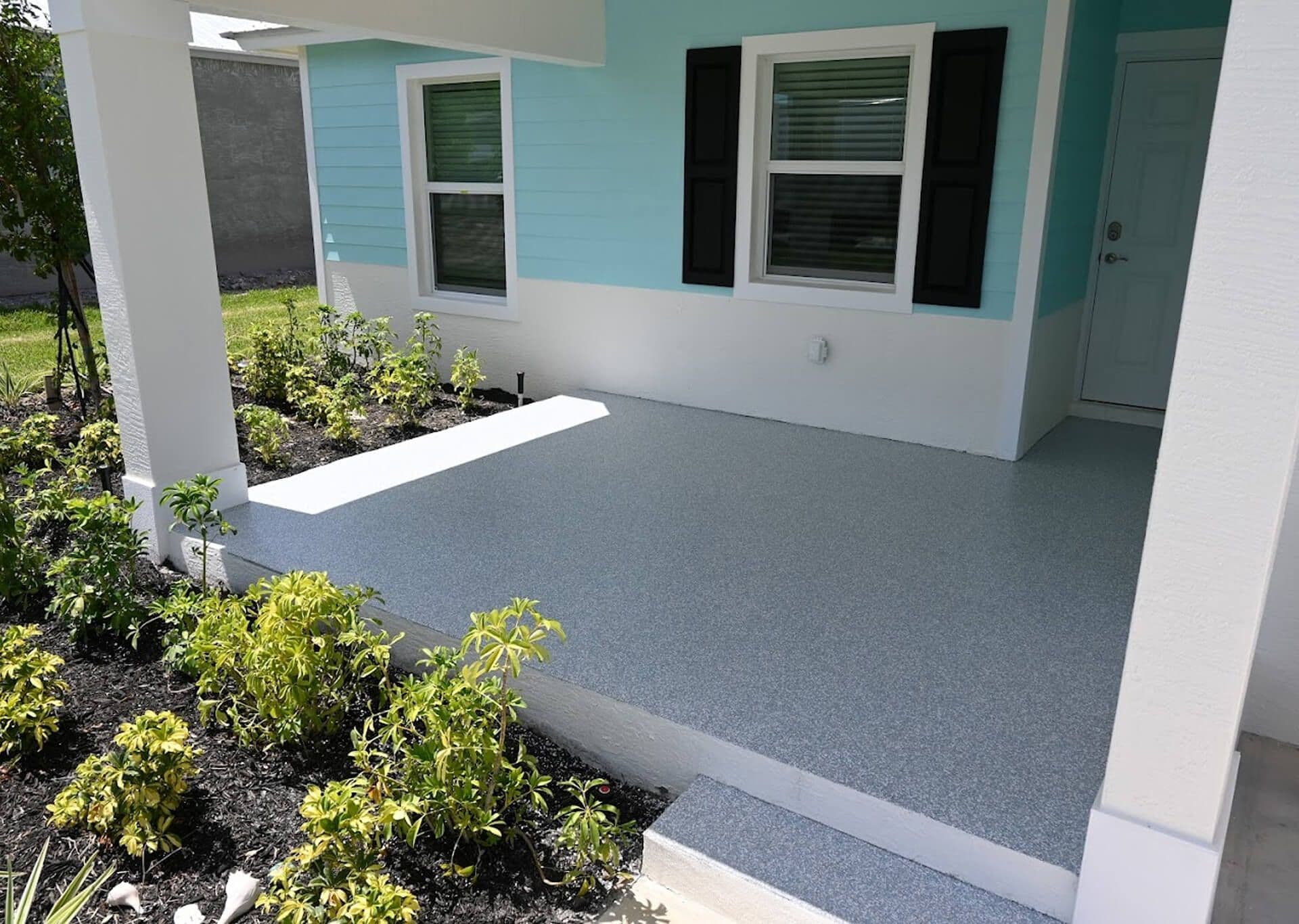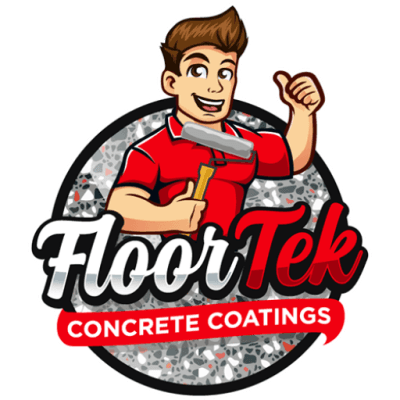How Long Does Epoxy Last on a Garage Floor?
The Honest Truth from Floortek

If you’re asking, How long does epoxy last on a garage floor, you’re already one step ahead of most homeowners. You’re not just looking for a shiny floor; you're looking for a wise, long-term investment. You’ve probably seen a neighbor's garage floor peeling and flaking, and you want to know how to avoid that exact problem.
We're Floortek CoatingsWe're glad you're here. With years of experience repairing and replacing failed epoxy floors in homes like yours, our commitment to quality and understanding of what works will give you confidence in our service.
So, let's get right to the honest answer.
The lifespan of an epoxy floor depends entirely on two things: the quality of the materials and the quality of the preparation.
A DIY (Do-It-Yourself) Epoxy Kit: These kits from big-box hardware stores typically last only 1 to 3 years in most U.S. climates before they start to peel, flake, or turn yellow.
A "Professional" Epoxy Installation: This is a wide range. A standard job from a general painter or a "budget" installer might last 3 to 7 years. A high-end, multi-day epoxy installation might last 5 to 10 years, but it still has significant flaws.
But here’s the secret: the question isn't just about how long it lasts. It's about why it fails. Epoxy is an older technology, and numerous problems plague it. It’s essentially a rigid, brittle sheet of plastic sitting on top of your concrete.
The lifespan of an epoxy floor depends entirely on two things: the quality of the materials and the quality of the preparation. Choosing the right system can give you peace of mind for years to come.
The Real Reasons Epoxy Fails So Quickly
We receive calls every week from frustrated homeowners whose epoxy floors are peeling. The failure almost always comes down to one of these problems.
1. Hot-Tire Pickup (The #1 Epoxy Killer)
This is the most common complaint. You drive your car on a hot day, and your tires get warm; then you park it in the garage. The hot tires transfer heat to the epoxy, which softens. When you back your car out the next morning, the tires have cooled and shrunk slightly, pulling the epoxy coating right off the concrete and leaving a perfect, tire-shaped bare spot.
This is a chemical failure. The rubber and polymers in your tires bond with the weakened epoxy. Once this starts, the floor is officially failing, and it will only spread. This is especially a problem in warmer states, but even a hot summer day in the Midwest can cause it.
2. Poor Surface Preparation
This is the industry's biggest secret. Epoxy does not bond with your concrete; it just sits on top of it. For it to have any chance, the concrete must be mechanically profiled—meaning it must be opened up—so the epoxy can grab on.
Most epoxy installers, as well as all DIY kits, employ a method known as "acid etching." This is just a fancy term for washing the floor with a strong acid. It cleans the concrete, but it does not open its pores. It’s like trying to paint a sheet of glass. It might look good for a month, but it has no real grip.
At Floortek, we never acid etch. We use industrial-grade diamond grinders. This process is similar to sanding wood before staining it. It removes the weak top layer of concrete and opens up the pores. This enables our coating to penetrate deeply into the concrete and form a permanent chemical bond.
3. UV (Sunlight) Damage
Have you ever seen an old epoxy floor that looks yellow, faded, or "ambered"? That's because almost all epoxy resins are not UV stable. If you leave your garage door open, sunlight hitting the floor will slowly degrade the coating, turning it a sickly yellow. It makes a beautiful gray or tan floor look old and dirty in just a few years.
4. Cracking and Chipping
Concrete is a massive slab, and it moves. It expands in heat and contracts in cold temperatures. The life of concrete depends on its ability to handle this movement.
Epoxy, however, is highly rigid. When it cures, it becomes a hard, brittle shell. When your concrete slab moves with the seasons, the inflexible epoxy can't keep up. This stress causes it to crack, chip, and break. You'll see this failure start in the control joints (those lines cut into your garage floor) and spread.
5. Climate and Chemical Warfare (Road Salt)
If you live in a state that gets snow, your car tracks in road salt, magnesium chloride, and other de-icing brines. These chemicals are designed to destroy ice, and they are just as brutal on your concrete and coatings.
According to the U.S. Environmental Protection Agency (EPA)Road salt damages property and is highly corrosive. Epoxy is porous, meaning it has tiny holes. That salty, gritty water seeps into the epoxy and gets trapped between the coating and the concrete. As it re-freezes and thaws, it expands, pushing the epoxy off the floor from underneath. This is known as "delamination," characterized by large blisters or bubbles in the coating.
A Modern Solution That Lasts: Why Polyaspartic Is Better
After decades of epoxy failing, our industry developed a better solution. We exclusively use an advanced polyaspartic coating system.
Think of it this way: Epoxy is like a sheet of glass. Polyaspartic is like flexible, high-impact safety glass.
Our polyaspartic coatings were initially designed for heavy industrial applications, such as bridges and wastewater treatment plants. We've adapted this technology to create the perfect residential floor. Here’s why it's 10X better than epoxy.
It Bonds Permanently. Unlike epoxy, which sits on top, our polyaspartic base coat is thinner and acts like a primer. After we diamond-grind the floor, this coat wicks deeply into the concrete's pores, adhering and forming a bond that becomes part of the concrete itself. It cannot be peeled.
It's 100% UV Stable. Our top coat will never, ever turn yellow or fade from sunlight. You can leave your garage door open all day. This is why it's also the perfect solution for our patio coating service and pool decks coating service. It stays looking new for decades.
It's 4 times stronger and More Flexible. Polyaspartic is more durable and abrasion-resistant than epoxy, but its real superpower is flexibility. It expands and contracts right along with your concrete, from hot summers to cold winters. No cracking, no chipping. It protects your concrete from damage.
It Resists Stains. Our system is non-porous. Oil, gasoline, road salt, and spilled drinks can't seep in. They stay on the surface, ready to be wiped away easily. You can learn more about Our Coating Products And their exceptional durability.
The Federal Highway Administration Has published extensive research on the damage caused by de-icing chemicals to concrete. Our system seals the concrete completely, protecting its lifespan By shielding it from corrosive materials.
Our 1-Day Installation: The Right Way to Coat a Floor
The best materials in the world won't last if the process is wrong. Our expert, certified crews have perfected a system that allows you to have a new garage floor in just one day.
Here is the Floortek process—no shortcuts, ever.
Step 1: The Grind (The Most Important Step)
We start by diamond-grinding your entire floor. This professional machine removes the weak top layer of concrete and any old, failing coatings. It creates a perfect, porous surface that is ready to bond permanently with our base coat.
Step 2: Concrete Restoration
Next, we repair your floor. We fill all the cracks, spalling (pits), and divots with a special mender that is stronger than the concrete itself. This ensures your final floor is perfectly smooth and seamless.
Step 3: The Polyaspartic Base Coat
We roll on our pigmented polyaspartic base coat. This is the layer that wicks deep into the concrete, forming that unbreakable bond.
Step 4: The Decorative Flake
While the base coat is wet, we broadcast a complete layer of your chosen decorative vinyl flakes. This isn't just for aesthetic purposes; it also adds texture and strength to the floor. You can see our vast range of Colors and Flake Options to match your home's style.
Step 5: Scrape and Vacuum
After the base coat cures (about an hour), we scrape the floor to remove any excess flakes, then vacuum it to achieve a perfectly textured finish.
Step 6: The Clear Top Coat
Finally, we apply our clear, 100% UV-stable polyaspartic top coat. This is the layer that locks everything in and provides that incredible protection against chemicals, sun, and scratches.
That's it. Our 1-day floor coatings mean you can walk on your new floor in just 4-6 hours and park your cars on it in 24 hours. Epoxy can take 3-5 days to cure.
Don't Stop at the Garage
The same technology that makes a garage floor indestructible is perfect for any concrete surface around your home. We can protect and beautify your:
Driveway Coating Service: Say Goodbye to Worrying About Salt and Ice Damage.
Sidewalk Coating Service: Enhance Your Home's Curb Appeal.
Patio coating service: Create a beautiful outdoor living space that won't fade.
Pool decks coating service: A great-looking surface.
Basement Coating Service: A Clean, Bright Finish for Your Basement.
You can see hundreds of examples of our work in our Gallery. You can also read more about us And our commitment to our customers.
H2: Stop Wondering How Long Epoxy Lasts and Get a Floor That Lasts
So, how long does epoxy last on a garage floor? Not long enough. It's a temporary solution that will cost you more time, money, and frustration in the long run.
Your home deserves a permanent solution. Our polyaspartic coating system is backed by our Life-of-Home warranty. It's a one-time investment that adds value to your home and provides a beautiful, usable garage.
Stop guessing about how long epoxy floors last. Stop wondering how long epoxy Lasts. And definitely stop worrying about the concrete lifespan Of your unprotected slab. People often ask how long concrete can last On its own, the answer is that it's vulnerable to damage from the day it's poured.
You don't just want a coating. You want peace of mind.
We are currently offering 30% off on the first installation for new customers!
This is the perfect time to get the floor you’ve always wanted. Let our team give you a permanent, beautiful solution in just one day.
Contact us Through our website to schedule your Free Quote, or call our team directly at 844-844-4164.
Frequently Asked Questions About Garage Floors
1. How long does epoxy really last on a garage floor?
A DIY epoxy kit typically lasts between 1 and 3 years. A professional epoxy job may last 5-7 years, but it is likely to fail due to hot-tire pickup, UV yellowing, or cracking from cold weather.
2. Why does my garage floor look yellow?
If you have an epoxy floor, it is likely yellowing because it is not UV-stable. The resin is breaking down from sunlight exposure. Our polyaspartic top coat is 100% UV stable and will never turn yellow.
3. What is 'hot-tire pickup' on an epoxy floor?
Hot-tire pickup is when your car's hot tires soften the epoxy coating. As the tires cool, they bond to the epoxy. When you back out, the coating peels off the concrete and sticks to your tires.
4. Is a polyaspartic floor better than an epoxy floor?
Yes, it's 10 times better than epoxy. Polyaspartic is 4 times more durable, more flexible (so it won't crack), UV-stable (so it won't yellow), and bonds to the concrete (so it won't peel).
5. Can you put a new coating over my old, peeling epoxy?
No. Applying a new coat over failing epoxy is like putting a new shingle on a rotten roof. The old epoxy will continue to peel, taking the new jacket with it. We must completely remove all old coatings by diamond-grinding the concrete to ensure a permanent bond.
6. How long does a Floortek polyaspartic floor last?
Our polyaspartic coating system is designed to last for as long as you own your home. We back it with our Life-of-home warranty.
7. How long until I can use my garage after installation?
Our 1-day floor coatings cure incredibly fast. You can walk on your new floor in 4-6 hours, and you can drive on it in 24 hours.
8. Does a coating help the lifespan of my concrete?
Absolutely. An unprotected concrete slab is vulnerable to salt corrosion, cracking, and spalling. Our system extends the life expectancy of concrete by protecting it from these damaging elements.
9. Is a Floortek floor hard to clean?
No, it's the easiest floor you will ever clean. Because it's non-porous, spills, oil, and dirt wipe right off. A simple sweep and an occasional mop are all it takes.
10. How do I get a free quote for my garage?
It's easy! Please feel free to call us right now at 844-844-4164 If not, please fill out the form on our Contact Us page. We’ll schedule a time to visit, measure your space, show you samples, and provide an exact, no-obligation price, valid for one year.
FREE In-Home Estimate
Plus 30% Off

Update Your Garage Today!
Get your new floor installed in just one day with Floortek’s garage floor resurfacing services! Call us today for a free quote!
Or contact us online to schedule your consultation!
